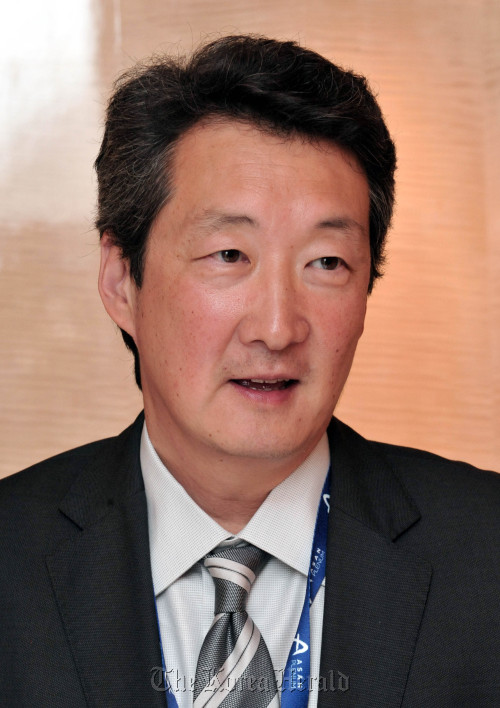Former White House adviser says Pyongyang not interested in bargaining over nukes
The history of doomed autocratic regimes suggests that impoverished North Korea under untested leadership may see its end in a collapse, a renowned U.S. security expert said.
“I think this combination of the young, untested leadership, economic problems, food problems; this is not a good combination for predicting the longevity of a regime,” Victor Cha, the Korea Chair at the Center for Strategic and International Studies, told The Korea Herald.
“All these dictators in Egypt and Tunisia and Syria and other places have all collapsed. Yet, despite all of this, we still have North Korea. Not only does it survive, but it goes into a third dynastic succession, which is, in today’s world, impossible to believe.”

|
Victor Cha |
Cha, who teaches at Georgetown University, is in Seoul to attend the 2012 Asan Plenum, a three-day international forum on global challenges that kicked off on Wednesday. The annual forum was organized by local think tank Asan Institute for Policy Studies.
While talking about its potential collapse, he pointed in particular to the possibility of destabilizing mistakes by the young, inexperienced Kim Jong-un, believed to be in his late 20s.
“The most (important) thing that we have to watch carefully is if he makes mistakes. I don’t think the split within North Korea is between reformers and hard-liners. The split is between those who are loyal to this continued family cult, personality, and those who might not be loyal to it,” he said.
“And the only way that split happens is if there are mistakes that are made. Kim Jong-un is now 28 or 29 years old. They (in that age range) make mistakes.”
Pointing out that Pyongyang’s ultimate goal is to establish itself as a nuclear-weapon state, the former White House advisor during the George W. Bush administration indicated that the six-party talks may not work well in achieving denuclearization.
“I don’t think North Korea is interested in bargaining away their nuclear weapons. They wanted to establish themselves as a nuclear weapon state that has a ballistic missile capability to reach the U.S. That is their ultimate security guarantee,” he said.
“People make the mistake of saying they are willing to negotiate, they are willing to give away their nuclear weapons program. No! They are willing to give you this, but they are not going to give you all the rest (of other nuclear programs).”
Regarding concerns here that given the approaching U.S. presidential election in November, domestic politics may affect Washington’s consistent policy toward the impoverished state, Cha said that North Korea “does not matter that much.”
He, however, argued that Obama’s strategy concerning the North was not successful.
“I don’t think this agreement with North Korea is giving them a major foreign policy success that could help Obama’s reelection. I mean North Korea doesn’t matter that much for U.S. domestic politics,” he said.
“Obama may see two nuclear tests and two missile tests before he finishes his term in office, which was more than what Bush saw. He only got one missile test and one nuclear test. Obama is an engagement person. I don’t think that strategy worked at all.”
The author of “Alignment Despite Antagonism: The U.S.-Korea-Japan Security Triangle,” Cha touched on the importance of regional security cooperation.
Although historical obstacles still hamper cooperation between South Korea and Japan, he underscored the need to move forward with a “pragmatic” standpoint.
“You cannot overcome historical animosity between Japan and Korea. But you have to cooperate pragmatically. What policymakers have to do is to cooperate, despite that, on whatever issues ... trade, security threats or climate change,” he said.
“They can’t allow themselves to get completely paralyzed by these historical things that happened a hundred years ago.”
By Song Sang-ho (
sshluck@heraldcorp.com)





![[Exclusive] Hyundai Mobis eyes closer ties with BYD](http://res.heraldm.com/phpwas/restmb_idxmake.php?idx=644&simg=/content/image/2024/11/25/20241125050044_0.jpg)
![[Herald Review] 'Gangnam B-Side' combines social realism with masterful suspense, performance](http://res.heraldm.com/phpwas/restmb_idxmake.php?idx=644&simg=/content/image/2024/11/25/20241125050072_0.jpg)
